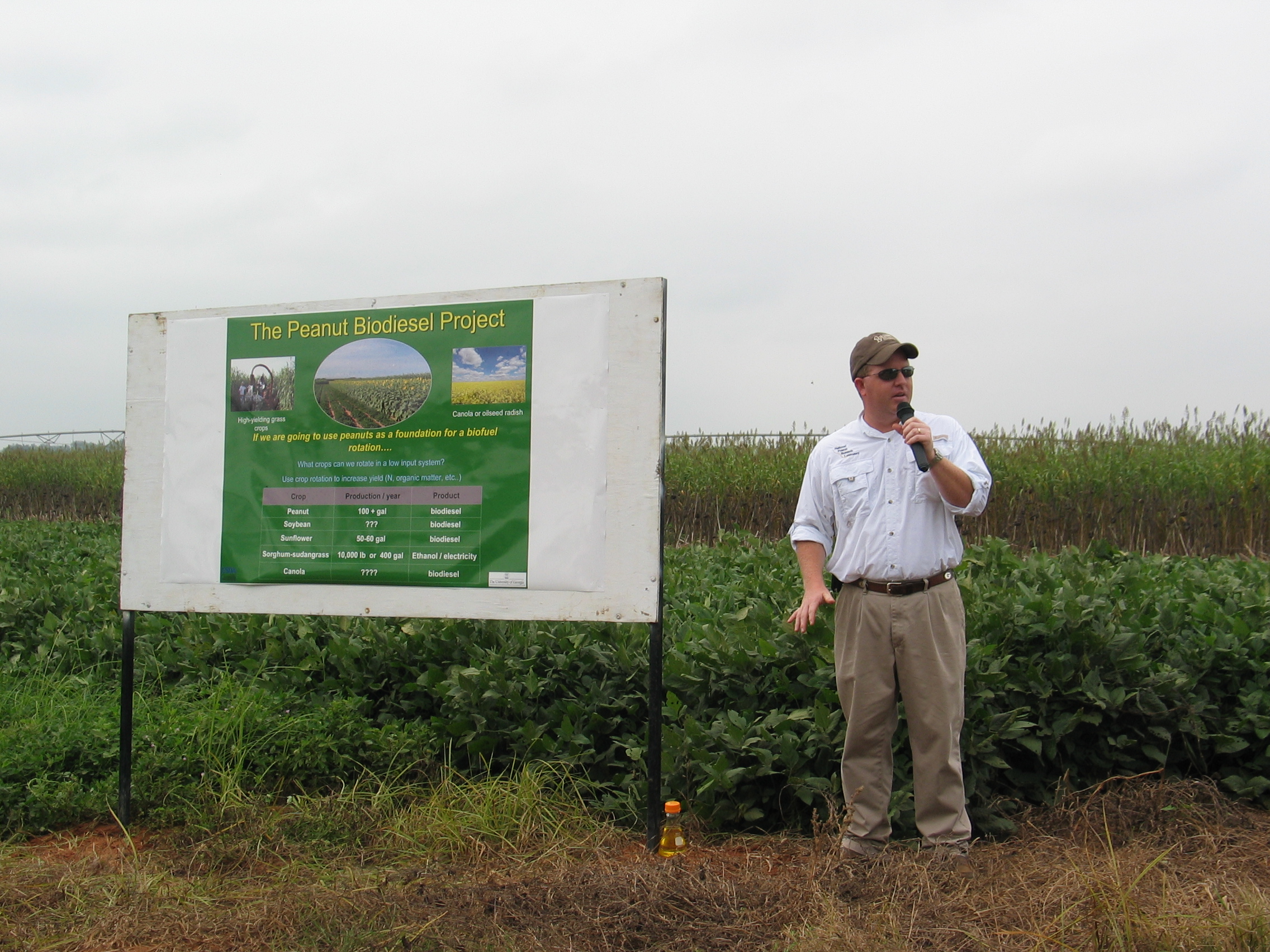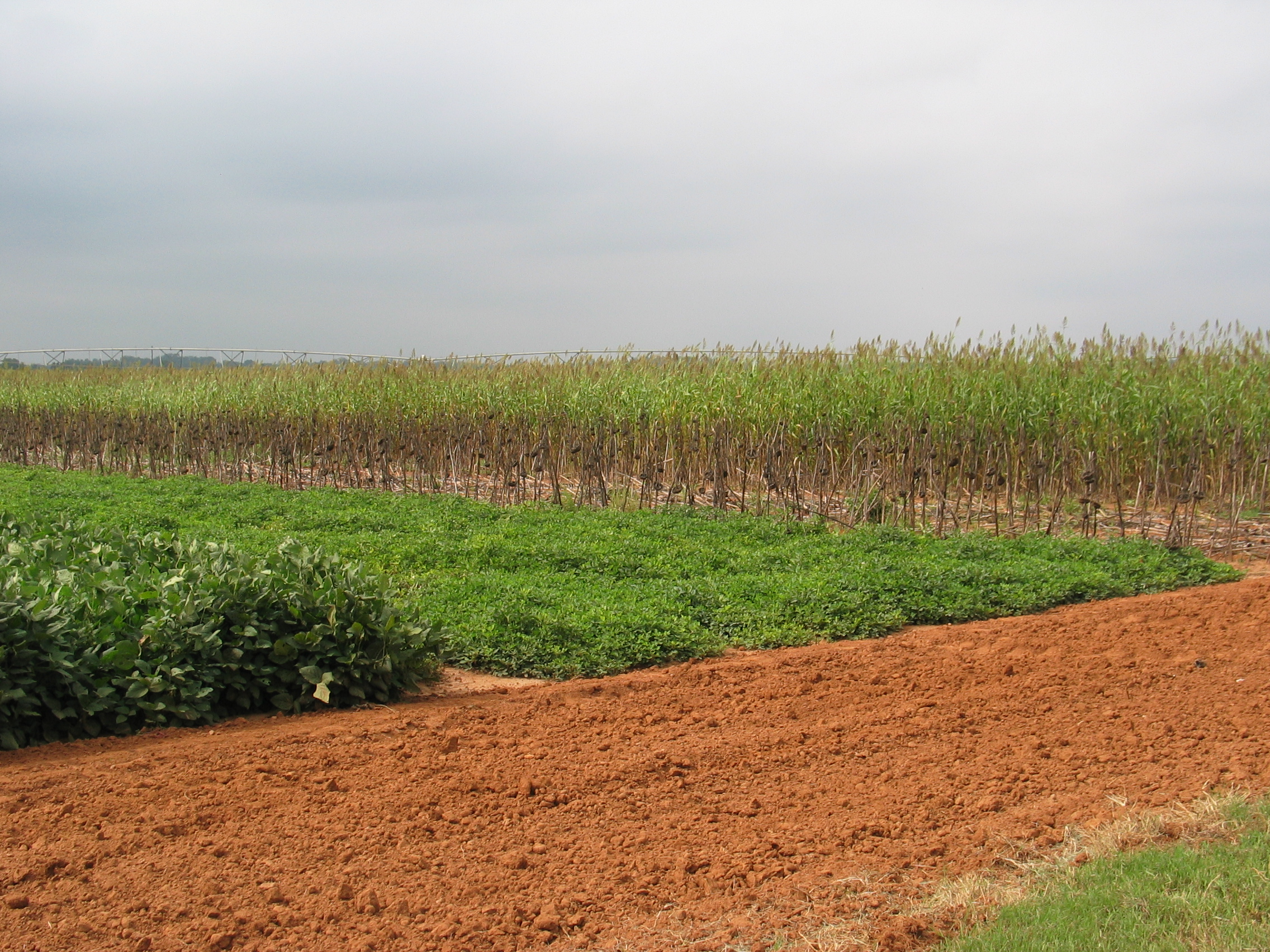 Wilson Faircloth, researcher with the USDA National Peanut Research Lab in Dawson, Ga., discussed the Peanut Biodiesel Project with the Georgia Peanut Tour attendees. Faircloth showcased the research he and other researchers are working on with production systems at the Southwest Georgia Research and Education Center. Faircloth has been working the last three years to develop production systems and look at peanut varieties that would be suitable for biodiesel. With this project he has had to throw out the old way of growing peanuts and look at completely new methods. One example is reviewing some peanut varieties that did not work in the industry because of shelling characteristics or taste. Those peanut varieties may not have worked for consumption but they could possibly work for biodiesel. Through this project Faircloth has been able to produce biodiesel for $2.65.
Wilson Faircloth, researcher with the USDA National Peanut Research Lab in Dawson, Ga., discussed the Peanut Biodiesel Project with the Georgia Peanut Tour attendees. Faircloth showcased the research he and other researchers are working on with production systems at the Southwest Georgia Research and Education Center. Faircloth has been working the last three years to develop production systems and look at peanut varieties that would be suitable for biodiesel. With this project he has had to throw out the old way of growing peanuts and look at completely new methods. One example is reviewing some peanut varieties that did not work in the industry because of shelling characteristics or taste. Those peanut varieties may not have worked for consumption but they could possibly work for biodiesel. Through this project Faircloth has been able to produce biodiesel for $2.65.
 The biofuel rotation study at the Southwest Georgia Research and Education Center involves peanuts, soybean and sunflowers during the summer. The rotation during the winter consists of canola and oilseed radish. This is the first year of this rotation study but Faircloth predicts the yield for biodiesel at 100 gallons per acre from peanuts, 65 gallons per acre from soybeans, 50 to 60 gallons per acre from sunflowers and 75 gallons per acre from canola. In the rotation, Faircloth is also growing Sorghum-Sudan Grass for ethanol. Approximately 10,000 pounds of dry matter of the grass would producer 400 gallons of ethanol. By using the biofuel rotation this would provide a farmer with a flow of material throughout the year. Of course Faircloth does not want farmers to stop growing peanuts for consumption. Instead he recommends that farmers set aside a small acreage for their biodiesel. Farmers would also have to throw out the old way of thinking when it comes to controlling disease or weeds in the field. The peanuts grown for biofuel can be grown with fewer inputs than peanuts grown for consumption. Peanuts have the highest oil potential in the Southeastern U.S. so with this biofuel rotation study farmers may find just what they need to supply fuel for their farm.
The biofuel rotation study at the Southwest Georgia Research and Education Center involves peanuts, soybean and sunflowers during the summer. The rotation during the winter consists of canola and oilseed radish. This is the first year of this rotation study but Faircloth predicts the yield for biodiesel at 100 gallons per acre from peanuts, 65 gallons per acre from soybeans, 50 to 60 gallons per acre from sunflowers and 75 gallons per acre from canola. In the rotation, Faircloth is also growing Sorghum-Sudan Grass for ethanol. Approximately 10,000 pounds of dry matter of the grass would producer 400 gallons of ethanol. By using the biofuel rotation this would provide a farmer with a flow of material throughout the year. Of course Faircloth does not want farmers to stop growing peanuts for consumption. Instead he recommends that farmers set aside a small acreage for their biodiesel. Farmers would also have to throw out the old way of thinking when it comes to controlling disease or weeds in the field. The peanuts grown for biofuel can be grown with fewer inputs than peanuts grown for consumption. Peanuts have the highest oil potential in the Southeastern U.S. so with this biofuel rotation study farmers may find just what they need to supply fuel for their farm.
National Peanut Research Lab Peanut Biodiesel Project
2008 Georgia Peanut Tour Photo Album
